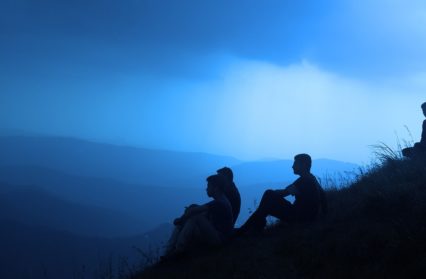My Brother’s Keeper by Mustafa Hameed highlights the influence of religious and cultural factors on approaches to mental health in South Asian Muslim communities and the need for mental health practitioners dealing with individuals from such communities to not be dismissive of these factors. This article is the latest in a series of blogs on mental health put together by May’s Artist in Residence, Durre Shahwar. Throughout 2017 artists, including Durre Shahwar will take a leading creative role in what Wales Arts Review publishes, centring their skills on a challenging project over the course of a month. We were inundated with applications, receiving hundreds of emails about the positions, and it was no easy task whittling down all that talent to this final eleven. Our team of six editors debated long into the night, and in the end, we decided on a collection of people who we most want to work with, and whose work excites us. We think you will be excited by them too.
Mustafa Hameed is an aspiring writer who has explored a personal experience for this piece. For more work by Mustafa, take a look at his other Wales Arts Review pieces.
My Brother’s Keeper by Mustafa Hameed

I catch the coach home. It’s a Sunday morning in early March. Just a day before, my sister had rung me in the dead of night to say that our older brother “wasn’t well”, before adding somewhat reluctantly, “in the head”. From other family members, I hear words such as paagal (crazy), majnoon (crazy), and talk of jinn possession and jadoo (the word for black magic in Urdu). These are all terms used within South Asian Muslim communities to describe (away) those suffering from debilitating mental ailments. As I travel home, I am not sure what to expect.
As I journey down, I begin making compassionate resolutions in my mind. I would do everything within my means to help my brother, just as he had helped me and my six other siblings all those years ago, by assuming the role of a father figure in his twenties, after our own father had been snatched away from us by a brain aneurism at the age of forty-two.
But I also make another vow: I vow to protect him from the stigma that is commonly attached to people suffering from mental health problems within South Asian communities and the religious quack doctors that are often called in to “help” them.
My brother does not know I am coming to see him. He does not know that I am his keeper. Within the space of forty-eight hours, he has moved into the family home, surrounded by stuffed suitcases, where he would spend more than a year sleeping on a sofa in our living room.
As I enter my childhood home, I feel myself being enveloped by an ominous midst of sorrow and grief. There is an unnatural silence and the exhausted faces of my siblings, who try to force a smile upon seeing me, encircle me.
My brother is sitting at the family dining table. His hands clasped around a mug of smouldering chai, my mum beside him as if holding counsel. He looks silently up at me as we shake hands, smiles through smarting eyes, and then bursts into involuntary sobs, burying his weary head into my chest. I look at my mother for answers but she is weeping now with her eyes downcast, perhaps with even a sense of shame. It feels like the grief after a death. In fact, the last and only time I recall weeping with my brother like this was when our father died. I remember curling into him like a newborn child, exhausted from crying, from trying to comprehend the eternal absence of our late father, as he shielded me from the cruel reality of our loss.

I soon learn that my forty-two-year-old brother and his wife are going through a messy divorce. They have been experiencing problems for years, but he had masked them with his characteristically northern masculinity and habitual humour. The kids have also inherited this damaging stoicism and state of denial from their parents and begin to fall into a depressive state of their own, as does his wife who has a back catalogue of mental health problems.
As his mental state declines, members of our family cite my brother’s irreligiosity and lack of Islamic practice, hurling it back at him as the primary source for the breakdown of his marriage and his psychological state. He is guilt-tripped into becoming more religious by holy-than-thou religious quack doctors and itinerant pseudo “shaykhs”. He is forced to make confessions and amends for screaming the word talaq (“I divorce you!”) three times at his wife during a heated argument (some interpretations of Islamic law say that this is enough to nullify a marriage). It was in the midst of this confusing wilderness that the Black Dog had leapt out, deciding to pursue my brother like a suffocating shadow.
We as a family are not prepared for what will follow. We are unprepared for the continuous nights of wailing and incoherent ramblings as he paces up and down the house while smoking up to sixty cigarettes or more a day. We are unprepared for the severe knock-on effects of sleep deprivation night after weary night. We are unprepared for the unhygienic regime he falls into whereby he ceases to change his clothes, shower or brush his teeth. We are unprepared for the detrimental levels of paranoia and outlandish accusations which range from his obsession that he may have cancer of the mouth, or that someone may have carried out kala jadoo (black magic) on him, that he is being punished by Allah for past “sins” or accusations that someone – one of us – has tried to spike his water with alcohol. We are unprepared for the constant and chaotic talk of suicide, of him telling us he has taken a dozen paracetamol tablets or rat poison when he hasn’t. Gradually, we are forced to take on the burden of nearly every aspect of his life, from his personal finances to doing everything in our power to make sure that he does not lose the job he has had for almost a decade. We also try our best to salvage his diminishing relationship with his children.
As time goes on, tensions begin to flare in the family home. On a few occasions, the police and ambulance services are called in to deal with my brother’s increasingly erratic behaviour. We argue endlessly about possible causes, and, most importantly, about possible solutions. Our discussions range from cultural-religious approaches to systematic medical care. In our growing desperation, we turn to a hotchpotch of individuals and approaches, beginning with the GP, the local mental health intervention team, Imams who assume the role of trusted counsellors, as well as pleading for the intervention and assistance of close family members and friends. At one point my mother even suggests taking him “back” to Pakistan to visit the village hakim (doctor’s versed in Islamic medicine).

I learned terms like parasuicide, about the early stages of psychosis, I even get told off by a friend for over-Googling psychological conditions. I also look into Islamic-based therapies or professional mental health services that are versed in the motifs, symbols and vernacular of religious worldviews. I am convinced my brother needs a mixed-based or bespoke mental health programme but I can’t seem to find anything out there. I read the statistics on male suicide. I read how men are three times more likely to commit suicide then their female counterparts and that this number was increasing. I read about how the quality of mental health provisions depends upon socio-economic and cultural factors and how a lack of cultural sensitivity and awareness greatly impinges upon the recovery of people suffering from mental health within the South Asian communities.
The months of searching leave me mentally and physically exhausted and nonetheless wiser. During the process, I realise how much we as a family don’t know. I realise our ignorance of modern mental health conditions and our unreasonable, collective distrust of medication. I have realised that being my brother’s keeper has been detrimental to my health.
If at the level of the individual, the first step in dealing with depression is to admit that one is depressed, then I would argue that at the collective level, the first step is to acknowledge the communal deficit of knowledge and awareness that exists in dealing with mental illness within South Asian Muslim communities. Put simply, we lack the vital lingua franca needed to navigate the psychological spectrum of mental disorders. The absence of terms for disorders such as psychosis, schizophrenia, depression or bipolar disorder, is indicative of this. As a result, people suffering from mental health conditions in South Asian Muslim communities are often left in hostile socio-cultural environments not conducive to their recovery. In fact, as with my brother’s case, these conditions oftentimes exacerbate the said individual’s mental state. Our willful ignorance and lack of awareness literally translate into a matter of life and death for so many, especially South Asian women who have among the highest rates of suicide and attempted suicide in England, for example.
In South Asian Muslim communities, psychological disturbances are often attributed to external unseen spiritual forces. Belief in the unseen is one of the cardinal articles of the Islamic credo. Such ideas as jinns, a race of invisible beings created by Allah from fire and capable of possessing humans are often blamed for the rupture in a person’s psyche. Such ideas are a Quranic reality and an ontological staple of the Muslim weltanschauung. Human power over jinns is often associated with sorcery or black magic (kala jadoo) and many believe that one’s enemies can call upon and inflict the jinns through an act of vengeance. Given that such ideas are part and parcel of the Islamic worldview, a worldview which is, rightly or wrongly, ubiquitous while growing up, it is unsurprising that such things surface during psychotic episodes or are used as (simplified) reasons to explain away complex aberrations from what is considered “normal” behaviour.

During the months that follow, I adamantly protest against any mention of supernatural influences or interventions by people whose only qualification in dealing with mental health is that they are somewhat versed in Islamic theology. This strains my relationship with some of my family members.
After writing countless letters to GPs, mental health charities and the local mental health intervention team, I finally get a home care team to visit my brother. However, the level of care is atrocious. My brother is never visited by the same carer, and when the carer does arrive, they simply ask him a few basic questions, watch him take his medication, and then leave. There is no attempt at rapport or trust-building. It is clear by these hectic visitations that the deprived area we live in is inundated with referrals and resources vastly overstretched. No consultation or updates are given to the family. No reports, no feedback nor alternative routes of care are suggested. My brother discharges himself in less than a week without any signs of improvement. He is thrown back into the turbulent family environment.
Scientifically-minded folk would argue that since things contained within the realm of the Islamic “unseen” can neither be measured nor observed, they should be confidently dismissed – but it is not as simple as that. It is not simple because we as humans are not.
What was conspicuously absent was the lack of religious or cultural awareness by the mental health professionals that visited my brother. Of course, one does not expect them to be theologians or for them to be versed in the “fine art” of exorcism, but one does expect mental health practitioners involved in the process of an individual’s recovery to take religious and cultural factors seriously if the patient does. It would be disingenuous not to do so and outright dismiss to engage with such things may lead to missed opportunities that may have assisted in the patient’s recovery.
Religious myths that surface during mental illness should not be judged through a false/true dichotomy but should rather be viewed as another prism through which the world is understood or made sense. At the same time, religious worldviews should never be exaggeratedly foregrounded nor given uncritical precedence over systematic medical care and/or tried and tested methods.
As I write this, I still don’t know what the future holds for my brother. Though, as his keeper, I am cautiously optimistic that optimism is wearing thin daily owing to so many setbacks, especially in terms of tailored medical care. I truly believe that mental health is something that will only be managed, (for it can only be managed and never cured), through a concerted effort within South Asian Muslim communities. We need campaigns that raise awareness and networks of trust. We need to, as a community, learn the language of mental health disorders. The more approaches we have for tackling what is fast becoming an epidemic, the more lives can be saved.
My Brother’s Keeper by Mustafa Hameed is part of Shahwar residency at Wales Arts Review in the new series, Artists in Residence.
For more work similar to My Brother’s Keeper by Mustafa Hameed, take a look at the Wales Arts Review website.
Mustafa Hameed has written other pieces and they are available here.










